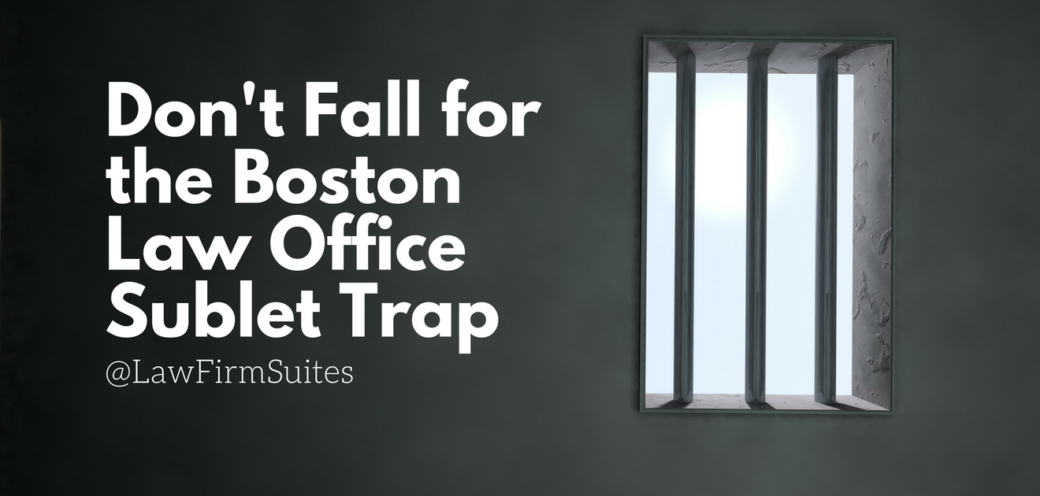A cheap Boston law office sublet can seem like a great bargain, but their allure and excitement can are often too good to be true.
Not every law office rental is going to be a home run. Sometimes, dollar signs are the deciding factor when it comes to whether a person likes a particular office space or not. Thus when a particular space is “cheap” in price, people sprint towards it.
Most people who are interested in shared office space come looking for a good deal. Low fees peak their interests even if they hate the space.
Subleasing empty office space from another law firm is common for solos in major cities like Boston or New York City get office space. Often, you don’t have to make a long-term commitment and the office may include some of the things needed to run a firm, like furniture, internet, copy machines and phones.
But unlike a commercial landlord or executive suite operator, a law firm is not “in the business” of managing professional office space. It can be challenging to get the information needed to pick a great space.
Here are the top five things you should be afraid of with a cheap Boston law office sublet:
1. Financial problems are typically the reason behind a Boston firm’s law office sublet.
A firm with that is subleasing an empty office space often is a result of their financial situation. You can tell because they are willing to waste valuable billable time on finding someone to occupy the space.
Plus, there are many reasons the office may be sitting empty. Most likely they either took on too much space and need to rent it our so they can cut costs or the firm downsized, resulting in the extra space.
Law firms price empty office below market because they need the money fast.
For a law firm in bad financial standing, the situation will likely only get worse, never better. It’s important to research the subleasing firm before considering their open office sublet.
2. There is a reason why law firm can price offices cheaply.
An executive suite will typically have reliable high-end resources as it is a huge part of many shared office providers. Providing such resources requires the office to be managed by trained professionals which costs a pretty penny.
One thing that is commonly sacrificed for a struggling firm is adequate staffing, allowing them to price below market. You may save a few dollars on the actual space, but will find yourself hemorrhaging on resources elsewhere.
The two complaints we hear about most often are reception and internet services.
Most offices will have a receptionist that greet your clients. If the receptionist has a not so fresh attitude or is an embarrassment to themselves and others, it does not look good for your business. Even worse, the sublessor may tolerate this person’s ill-advised behavior leaving you with the only option of moving elsewhere.
As for internet, it’s not uncommon for law firms to have insufficient bandwidth causing the internet to be painfully slow. Your only recourse may be to install your own Internet line at a substantial additional cost.
Being a landlord is a full-time gig. The law firm that offers a Boston law firm office space sublease must manage landlord responsibilities in addition to their full-time legal practice.
3. Wacky rules (or worse, no rules at all).
One of the nice things about renting your own office directly from a commercial landlord is that you get to make up your own rules. And sublessor firms do just that.
These rules are designed to keep the center a civilized place to work.
In a Boston law office sublease, it’s not uncommon to have to deal with quirky rules set by the sublessor. Things we’ve seen, for example:
- You must have cherry wood furnishings purchased from Room and Board.
- The cost of paper is split between all lawyers whether you use the copy machine or not.
- You can use the conference room anytime you want, unless your landlord’s firm needs it; then you’re on your own.
Quirky rules can be a common theme with shared office spaces. However, there can be the instance of no rules. No rules can make for a whole other kind of mess and may reach a level of tackiness that is unbearable.
Some law firms know that they have odd rules, and are willing to price offices cheaply to entice someone into their wacky world.
4. The sublessor law firm doesn’t see you as part of the longtime solution.
Successful law firms that sublease out their extra offices may have no intention of keeping you long term and that is a problem.
If the firm hires more people, you may get kicked to the curb because now they need that space. This is just business and you shouldn’t have any long-term plans to continue with this arrangement.
5. The master lease is up for renewal soon.
Similar to the item above, sometimes firms have very little time left on their lease and they have no intention to renew. Partners of disbanding firms may be on the hook for personal guarantees, so they are hanging on until the lease term ends. These firms need subtenants to stop the hemorrhaging of cash, so they price office cheaply to fill quickly. Of course, there may be a lot less time left on the master lease than you thought, leaving you in the dark when it runs out.
Sublet office space can offer a solo law practice or small law firm with a proper office at a good value. That is, as long as you do your homework and understand exactly what you are getting yourself into.


